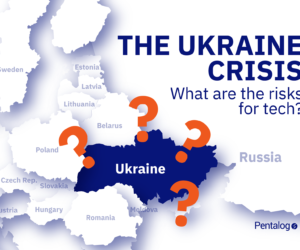The 2022 global IT market is on track for $4.5 trillion in spending, a strong 5% overall growth rate which will intensify competition for tech talent, reports the analyst firm Gartner.
Despite the potential for further disruptions fueled by OMICRON, the tech sector’s upward trend is buoyed by shifts back to long-term investments, particularly in retail, utilities and medical. At the same time, hard-hit sectors such as entertainment and travel continue to lag, even if at Pentalog we see such companies continuing to invest.
Way out in front, infrastructure as a service is growing by more than 30%, driven by pandemic-related shifts in work and education. This seismic transition to cloud will continue to reshape the broader IT services market, where double-digit growth is predicted for software development and IT services.
After the turbulence of the past two years, “2022 is little bit more the calm after the storm,” says Gartner’s chief forecaster John Lovelock. With budgets flowing heavily to infrastructure expertise and enterprise software as pandemic-induced digitalization merges into long-term planning.
The headline Lovelock see for 2022 is return to the future. “We’re starting to see markets get back to a more traditional growth pattern,” he adds, echoing similar predictions from Pentalog’s CEO last fall, who pointed to the risks of understaffing critical projects.

Companies face intense competition to attract the tech talent they depend on.
Labor Shortages and Inflation Risks
The “Great Resignation,” a massive departure of workers from the workforce, will intensify competition for increasingly burned-out software engineers. Particularly in the US and UK, the best engineers will be in tight right supply, a trend we’ve been following for some time as a driver for IT outsourcing.
According to the US Labor Department’s January update, a record 4.5 million workers quit their jobs in November, with openings strongly outnumbering searchers. “The quits rate can serve as a measure of workers’ willingness or ability to leave jobs,” the department observes.
Or, as Gartner’s Lovelock says, with more than 50% of tech unfilled for 6 months or longer, “the ability to attract and retain talent is going to be more important than inflation.”
The phenomenon of tech workers quitting is driven above all else by the bounty of opportunities in the market: tech professionals have been under intense pressure during the pandemic and high demand gives them liberty to make a change. For many engineers, new employers seem to be offering better deals than current ones.
This is why at Pentalog we also see the “Great Resignation” as a sign that companies need to do better by their people. To avoid the very real risk of not having the talent bandwidth to accomplish critical priorities, tech companies need to think hard about what they offer (and not just money) and how they package it (company values matter).
Still, other commentators have noted recently that dissatisfaction primarily has not yet bottomed out, with reports of between a third and as many as three-quarters of US tech workers considering leaving their current positions in 2022.
“Employers should be worried, and those that are not clearly don’t appreciate the gravity of the situation,” writes Owen Hughes in the tech news site ZDNet.
“The success of businesses over the past two years has hinged almost entirely on their tech teams, and while the frenzied dash for cloud and software capabilities has plateaued, employers will need dedicated, motivated and energized tech workers on board to have any hope of ensuring their digital investments pay off in the long term,” Hughes adds.
At the same time, inflation will add to the challenge of hiring talent. While a fluid job market may not be directly inflationary, given the buffer between salaries and consumer prices, Gartner predicts that CTOs and CIOs will become increasingly cost-conscious even as they compete for talent. Many will look for ways to manage costs.
A key question we often hear from IT decision-makers is how to leverage increasingly IT outsourcing to shift work and relieve stress in internal teams, with increasing demand predicted for application development, infrastructure, and hardware support.
At the same time, attracting younger talent will increasingly require companies to focus more attention to intangible benefits, such as company integrity and ethics, as well as technological maturity. These are key considerations for tech workers early in their careers, critical “human” topics Pentalog has also discussed recently.
All Eyes on the Risk Appetite
Gartner’s forecast ends with provocative observation about the longer-term trends in IT spending, where market watchers predict company boards to push hard for bigger and bolder but also riskier tech bets.
If tech spending during the darkest days of the pandemic was about real-time adaptation to meet topsy-turvy customer demands, the current phase is an evolution. With digitalization projects maturing, companies today are looking to consolidate positions and update platforms for sustained competitive advantages in terms of customer loyalty and retention.
“Board of directors have increased their risk appetite as enterprises prepare for a post-pandemic renewal,” Gartner comments. “This is because making investments and strategic decisions in an environment of heightened uncertainty requires an increased level of risk-taking.”
“Interestingly, for the first time, boards view an economically and politically volatile society as the biggest risk they have to deal with,” the analysts note.
The disruptions of the pandemic will have lasting consequences for the IT market as a social force, and the values companies being to the table. Stay tuned for news from Pentalog on this topic.



 (3 votes, average: 3.67 out of 5)
(3 votes, average: 3.67 out of 5)







